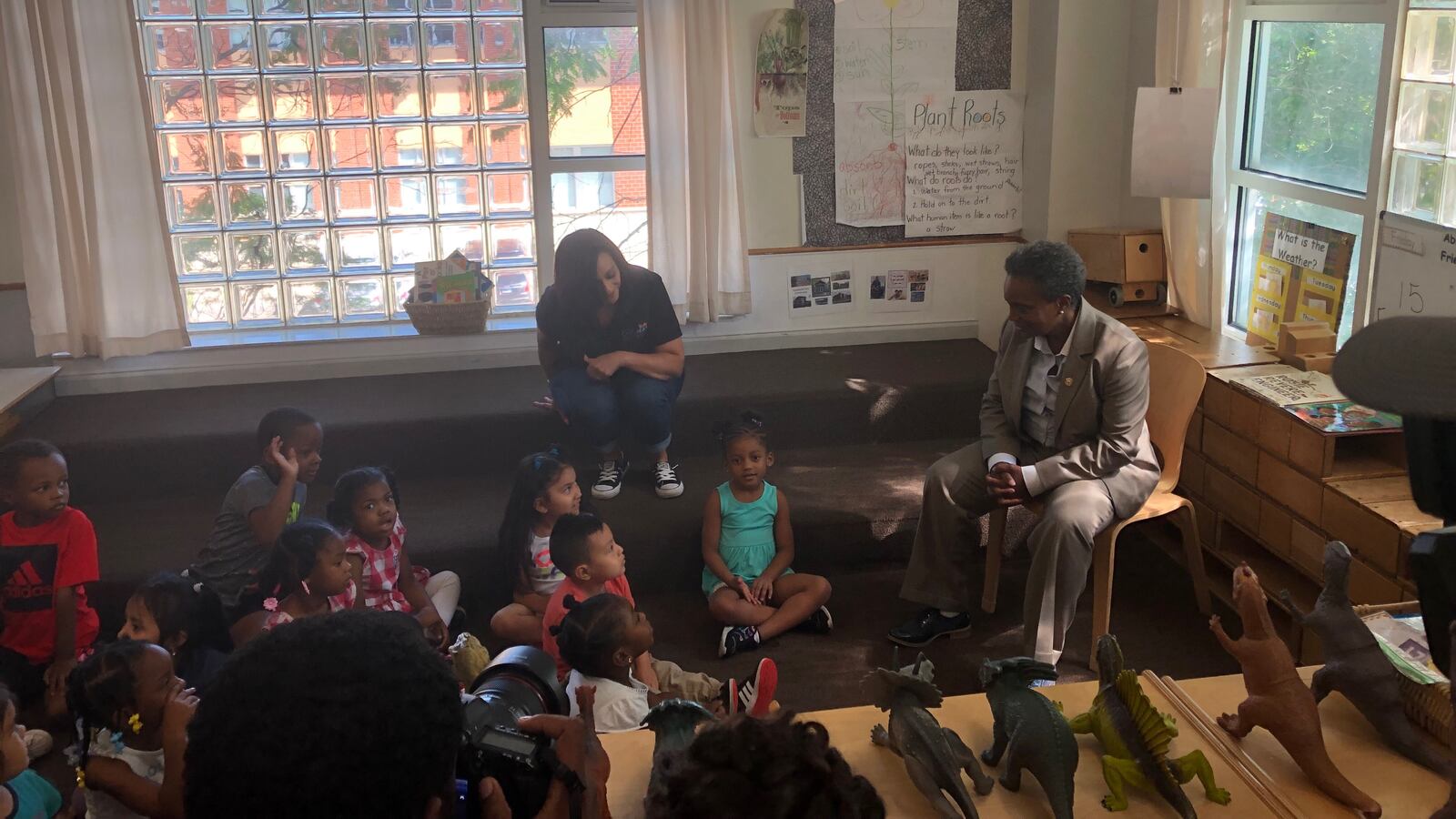With the start of school three weeks away and 8,000 vacancies reported in programs for 3- and 4-year-olds across the city, Mayor Lori Lightfoot took the podium Friday to urge more families to apply.
The event, at a press conference at the Chicago Commons Nia Learning Center in West Humboldt Park, was notable not just for flagging the thousands of open seats. In a sign of unity, Lightfoot stood with top administrators of two governmental departments that manage preschool and that haven’t always coordinated their work.
“We’re trying to play a role in bringing the two sides together,” said Lightfoot, who earlier in the morning had read a children’s book by Toni Morrison, in a nod to the iconic writer who died this week, to a class of eager 3-, 4- and 5-year-olds. “CPS cannot, and will not, do this alone. Community providers are critically important to the infrastructure.”
It’s been an open question in the city’s early learning community about how the city’s mayor will steer the future of universal pre-K for the city’s 4-year-olds.
Her predecessor, Rahm Emanuel, announced the plan last spring, but then stepped down in the first year of the rollout, leaving an uncertain future for a program that has the potential to impact as many as 45,000 children.
The program remains without critical point person in the mayor’s office since the former chief left Chicago for a job in Massachusetts.
Lightfoot has pledged to create birth-to-5 zones with wraparound services but has offered few details. On Friday she made clear that she wants to bridge the divide between community-based preschool providers and school-based pre-Ks, who’ve been competing for students and qualified teachers.
One potential starting point could be helping community providers increase salaries for their teachers — a step that cities like New York have taken under pressure from strapped nonprofit directors and business owners.
Asked specifically about salary parity, Lightfoot said, “we have started steps in that direction,” and underscored an additional $42 million that Chicago said it is making available to community providers as part of a grant renewal. “(That renewal) has to be a process (we use) to fairly compensate the teachers who are taking care of our most vulnerable and youngest children. I don’t want the teachers in the early childhood learning space to be living hand to mouth and living paycheck to paycheck.”
In the past year community providers have complained that they were losing students and teachers to schools, and also that the city had created an uneven playing field by offering free seats in schools while community programs often charge some families.
The city’s response was to encourage community programs to open up more seats for younger children — but strict caps on the number of babies per classroom still make it a challenge for providers to make ends meet.
Some warned they could go out of business. Parents also reported confusion over the various options, which programs cost money and which are free, and what services are available for children with special needs or who need after-school care.
“I know this is a change from past practices. In the past, city officials did not engage communities (on the issue), leaving far too many parents unheard and too many children left behind,” Lightfoot said. “That’s why my administration is having a listening session with community partners.”
Dottie Johnson, the chief financial officer of Chicago Commons, said she had participated in a recent session and that she felt a tone shift on the issue.
“The mayor was very receptive to our concerns and the challenges we’ve been facing and was willing to hear about some of the solutions we’re proposing,” Johnson said. “We see more money coming through to support our efforts, including raising our teacher salaries.”
Johnson said providers offered the mayor several recommendations, including pushing to eliminate the co-pay that some working families pay for day care and after-school care through the state’s child care assistance program. That could potentially require a change to state policy, since the program is administered by the Illinois Department of Human Services.
Chicago is adding 3,000 more pre-K seats this school year across community centers and schools. Most of those seats are in schools on the city’s South and West sides.
Even though the slots are not full, preschool applications are up more than 20% from the previous year, according to City Hall. Last school year, about 21,000 3- and 4-year-olds enrolled in Chicago preschool programs across schools and community centers, according to data obtained midyear by Chalkbeat.

